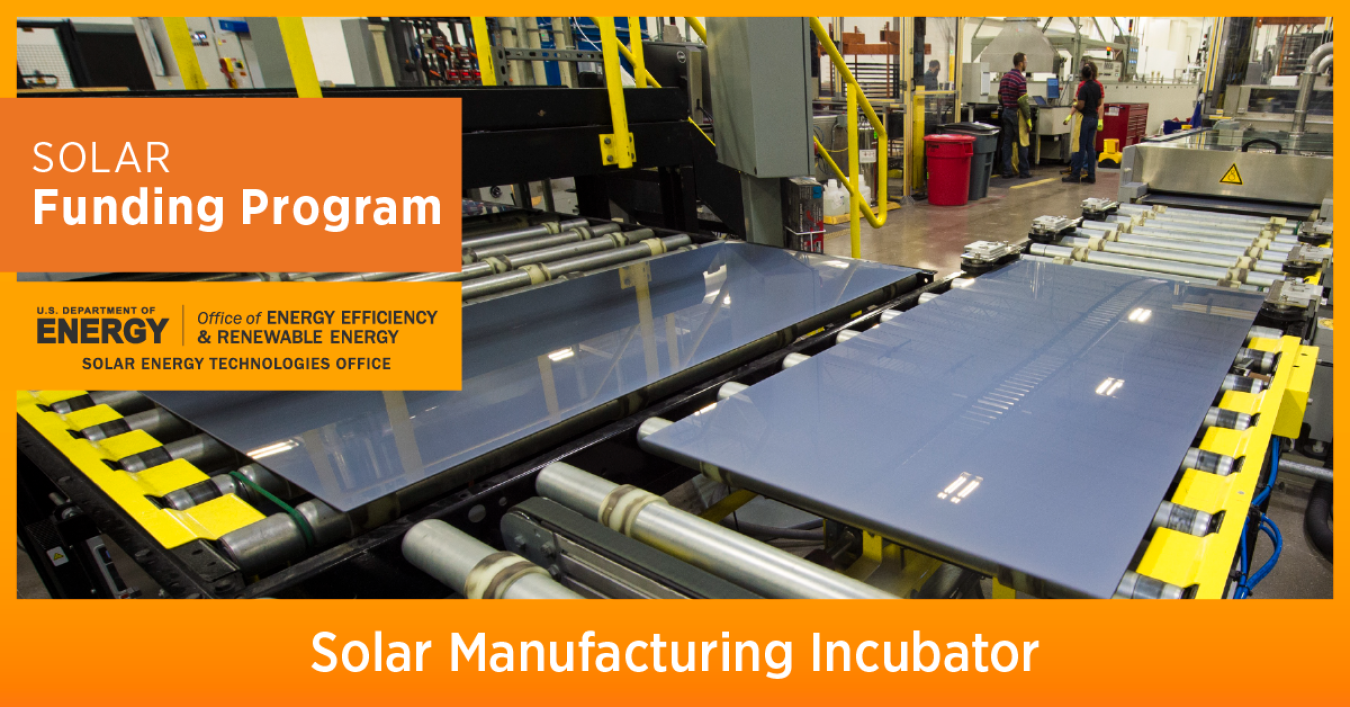
The U.S. Department of Energy (DOE) Solar Energy Technologies Office (SETO) Fiscal Year 2022 Solar Manufacturing Incubator is a $24 million funding program designed to accelerate commercialization of innovative product ideas that can increase U.S. domestic manufacturing across the solar industry supply chain and expand private investment in America's solar manufacturing sector, including the advancement of cadmium telluride (CdTe) photovoltaic (PV) technologies.
DOE announced the funding opportunity on July 14, 2022 and announced the 9 selected projects on April 20, 2023. On May 18, 2023, DOE announced that an additional project was awarded $1.6 million.
Approach
This funding program seeks to invest in innovative research, development, and demonstration projects that enable continued solar cost reductions, while developing next-generation solar technologies and boosting American solar manufacturing, especially in CdTe PV. These projects support the scaling of affordable solar and facilitate secure, reliable integration of solar electricity into the nation’s energy grid to ultimately benefit the U.S. economy.
Objectives
SETO is funding these larger industrial research and demonstration awards in order to accelerate de-risking and commercialization.
SETO’s mission is to accelerate the development and deployment of solar technology to support an equitable transition to a decarbonized electricity system by 2035 and decarbonized energy sector by 2050. Achieving this goal will support the nationwide effort to meet the threat of climate change and ensure that all Americans benefit from the transition to a clean energy economy.
Selectees
-- Award and cost share amounts are rounded and subject to change pending negotiations --
Topic 1: Product Development
BREK Electronics -- This project is no longer active --
Project Name: A Three-Phase Commercial Solar String Inverter with DC Battery Interface Based on Silicon Carbide and Planar Magnetics
Location: Broomfield, CO
DOE Award Amount: $500,000
Cost Share: $125,000
Project Summary: This team is developing a new inverter technology based on a silicon carbide transistor and high-frequency planar magnetics that can significantly lower the cost and size of grid-tied inverters. This inverter can be manufactured in the United States and interact with battery energy storage.
Guardian Devices
Project Name: Safety Connectors for Mitigating PV System Arc Faults and Fires
Location: Albuquerque, NM
DOE Award Amount: $900,000
Cost Share: $225,000
Project Summary: This team aims to produce self-extinguishing PV connectors that will prevent fires in PV systems. The products will comply with national fire codes and be tested for mass production.
Litespeed Energy
Project Name: Integrated, Non-Metallic Floating PV System for Resiliency, Corrosion Resistance, and Safety
Location: Livermore, CA
DOE Award Amount: $1.6 million
Cost Share: $400,000
Project Summary: This project will improve floating PV systems, making them more resilient to wind and waves. The lightweight, integrated PV systems will enable reduced mooring costs and faster installation for the floating devices.
Makai Ocean Engineering
Project Name: Cost-Effective Primary Heat Exchanger for Gen3 CSP Systems
Location: Waimanalo, HI
DOE Award Amount: $600,000
Cost Share: $140,000
Project Summary: This project aims to de-risk an innovative heat exchanger for use in Generation 3 concentrating solar-thermal power (Gen3 CSP) systems. The technology uses high-temperature, high-pressure compatible materials with a design that is five times thinner than traditional heat exchangers, enabling significant reductions in material usage and costs.
Mirai Solar
Project Name: Retractable Solar Modules for Greenhouses and Beyond
Location: Mountain View, CA
DOE Award Amount: $1.4 million
Cost Share: $500,000
Project Summary: This project is developing and commercializing a foldable PV solar screen with variable shading and output power for controlled environment greenhouses. The lightweight, transparent screens can be retracted on demand and incorporate advanced light diffusion capabilities, creating a uniform shade under the screens while also producing electricity.
Mission Drives
Project Name: Low-Cost, High-Frequency Inverter Development for Utility Scale PV
Location: Potsdam, NY
DOE Award Amount: $1.2 million
Cost Share: $300,000
Project Summary: Mission Drives is developing an inverter to switch electricity input 100 times faster than conventional products using silicon carbide and gallium nitride wide bandgap components. This approach results in a smaller, lighter, more efficient, and lower cost product.
Planted Solar
Project Name: Novel PV Array System Design to Accelerate Solar Deployment, Reduce Levelized Cost of Electricity, Reduce Land Use Competition, and Increase Siting Flexibility
Location: Palo Alto, CA
DOE Award Amount: $1.6 million
Cost Share: $540,000
Project Summary: This project will develop, demonstrate, and validate a novel ground-mounted PV system design along with balance-of-system components and an installation methodology and equipment. Together, these innovations will enable highly automated installation of utility-scale PV at high speed.
Vitro Flat Glass
Project Name: High Performance Superstrate for CdTe Modules
Location: Cheswick, PA
DOE Award Amount: $1.6 million
Cost Share: $1.1 million
Project Summary: This team aims to improve the power output of cadmium telluride modules through a high-performance superstrate, which is the glass on which a solar module is built when the light will pass through the glass in the final configuration of the module. This project will integrate multiple performance increasing components into a single superstrate.
Topic 2: Demonstration of Cadmium Telluride Photovoltaic Technologies
First Solar
Project Name: Efficiency and Energy-yield Improvement of CdTe-based Tandem Solar Modules
Location: Perrysburg, OH
DOE Award Amount: $7.3 million
Cost Share: $7.3 million
Project Summary: This project is developing a cadmium telluride-silicon tandem module—a new residential rooftop product that is more efficient than silicon or thin-film modules on the market. The goals are to improve the tandem module’s efficiency and advance the understanding of climate-dependent specific energy yield and reliability.
Learn more about the Solar Energy Technologies Office’s manufacturing and competitiveness research, funding programs, and open funding opportunities.

